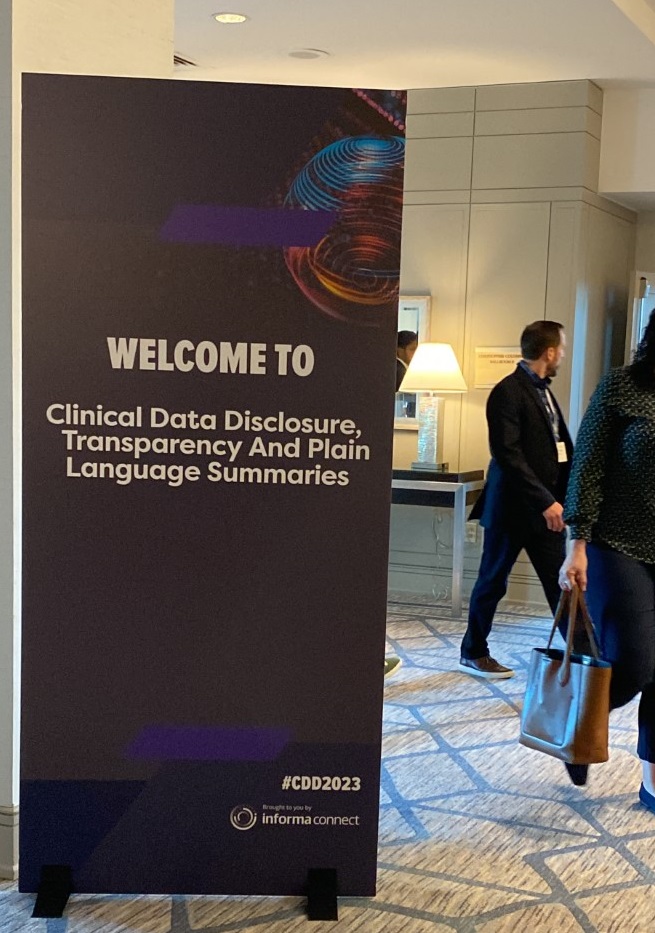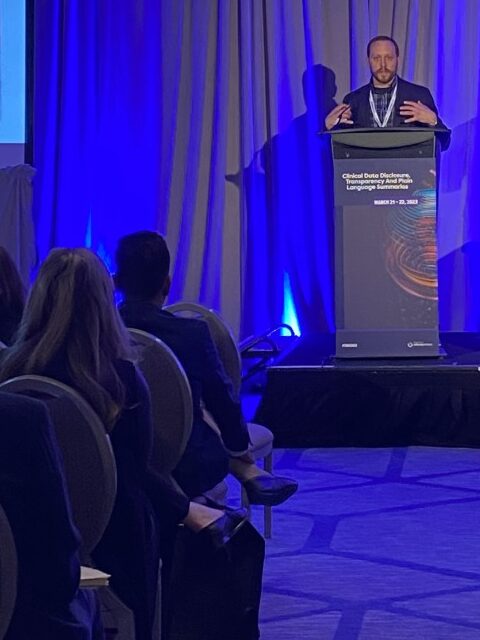The Clinical Data Disclosure, Transparency & Plain Language Summaries Conference just wrapped for 2023, bringing key decision makers in the pharmaceutical transparency space together at the Hilton at Penn’s Landing, Philadelphia.

Topics for this year’s Informa Connect Clinical Data Disclosure, Transparency & Plain Language Summaries Conference included the following three areas of focus:
- Regulatory Compliance – Safeguard and Prepare, including discussion on: EU CTIS submissions process and transitioning trials, UK registry post Brexit, EMA Clinical Data Publication Policy 0070, Health Canada update on Public Release of Clinical Information (PRCI), ClinicalTrials.gov modernization efforts, and Transparency registration in APAC with a focus on Japan and China.
- Benchmark and Share Hands-On Experience, including discussion on: Clinical Trials Information Systems (CTIS), redaction of Company Confidential Information (CCI), EU CTIS requirements for lay protocol synopsis and plain language summaries (PLS) of results, and promoting diversity and inclusion for PLS’.
- Network with Clinical Data Experts, including discussion on: Sharing global models for disclosure and transparency compliance operations, decision making needed in CCI considerations during document creation, the G7 100 Day Mission, creating plain language summary templates to align with the EU CTR, and strategies to organize the PLSP and PLS development tracks within an organization.
Processes for Plain Language Summaries
According to TrialAssure’s Director of Product Solutions, Zach Weingarden, speakers at the Informa Connect Clinical Data Disclosure, Transparency & Plain Language Summaries conference focused on sharing operational insights to streamline PLS development. This included:
- sharing best practices to consider when drafting a plain language summary,
- detailing necessary internal review processes, and
- outlining involvement needed from various team members and decision makers.
This aligned with the processes and expectations that Weingarden and the TrialAssure development team has incorporated into workflow management technology incorporated into our system to efficiently develop, translate, and publish plain language summaries.
Advancements in Artificial Intelligence (AI)
Weingarden spoke to a standing-room-only crowd on “How AI Can Streamline the Plain Language Summary Process,” with advancements in AI in the pharmaceutical industry as a key topic at the Informa Connect Clinical Data Disclosure, Transparency & Plain Language Summaries conference.

The abstract outlines:
“The overwhelming and time-consuming process of authoring Plain Language Summaries manually has become increasingly burdensome for sponsors. Advancements in Artificial Intelligence (AI) allows sponsors the ability to leverage machine authoring for PLS writing, while retaining full autonomy to manually augment the documents, as necessary. Artificial Intelligence has the potential to afford sponsors a global level of consistency.
With the ability to significantly reduce the time spent on the drafting process, writers can use AI to focus their time on the most impactful areas of their summaries, resulting in increased trial data utility and less time clinical trial patients must wait to receive their CTS. As requirements for PLS writing increase, Sponsors should not only feel a sense of obligation to streamline their PLS efforts but should also view this as an opportunity to find value in making trial information more accessible to the public.
This presentation will discuss the benefits of using AI in streamlining the PLS process, how these advancements are leading to more consistency across the PLS process, clinical trial patient benefits of more efficient PLSs, and the resources saved by Sponsors in switching from manual PLS writing.”
To see a demo and gain further information on using AI in this way, click to request a call.
Anonymization training is a key element
A third observation from this year’s Informa Connect Clinical Data Disclosure, Transparency & Plain Language Summaries conference is training for internal stakeholders. Weingarden shared, “There was a significant amount of discussion on training colleagues to understand what the health authorities view as company confidential information and what will be rejected.”
Training internal staff on what is generally accepted or rejected when anonymizing and/or redacting clinical trial data and documents has the potential to save a lot of back and forth conversations internally and externally with the agency. What can be considered company confidential information (CCI) is a hotly debated topic and opinions differ among stakeholders.
There are many reasons for rejection of CCI and the fact is that the pharmaceutical industry is still learning what will and will not be accepted. Communicating openly and often internally and sharing expectations to this point will help ease the process.
Design for Transparency™ is growing!
Years ago the leadership team at TrialAssure started using the term Design for Transparency, and now, we are beginning to see the depth of this philosophy spoken about more widely.
One presentation from Pfizer at this year’s Informa Connect Clinical Data Disclosure, Transparency & Plain Language Summaries conference detailed their approach to reframing how the entire organization thinks about transparency. To do so, they retrained every colleague to work with transparency at the forefront.
Weingarden explained, “The idea is to train medical writers and others within an organization to assume that anything they write has the potential to become public. With this mindset, the medical writers tend to write more lean, and do not include more information than is necessary.”
For further questions or clarification, connect with one of our pharmaceutical transparency experts.

